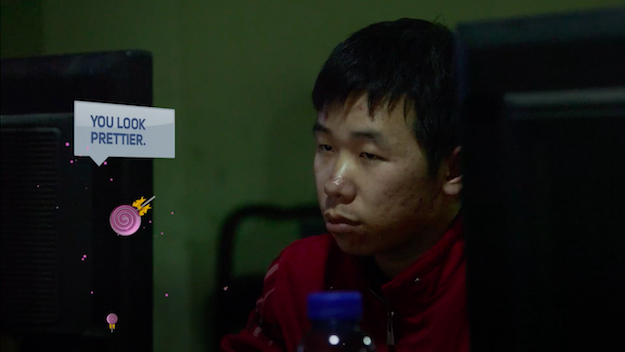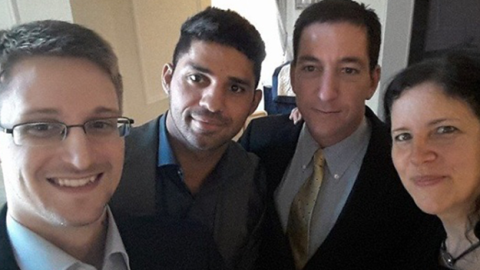Review: Cam + People's Republic of Desire

Cam
In the sly, unnerving prologue to Daniel Goldhaber’s pyscho-thriller Cam, protagonist Alice—or “Lola,” as she calls herself on the cam site FreeGirls.Live—is egged on by an anonymous viewer to hurt herself with a knife. Alice (Madeline Brewer) tries repeatedly to block and ignore the user, but when he keeps returning with increasing persistence, she succumbs angrily to his challenge. Perched on the floor of her kitschy, neon-pink room, wearing a barely-there cropped jacket and white underwear, she slowly slides a kitchen knife across her throat. Thick red blood oozes down her neck, and the camera holds still for a moment of petrified silence, interrupted only by the chatroom pings exploding from her computer. Then suddenly, Alice looks up with a wide smile: “Gotcha.” It’s all a ploy to climb the ratings, it turns out, coordinated with the help of a devoted fan and some DIY prosthetics.
There’s a Black Mirror-esque dystopian quality to this opening, but as another recent new release demonstrates, the phenomenon of people broadcasting outrageous things on livestream platforms is all too real. The central subjects of Hao Wu’s People’s Republic of Desire—a documentary about the massive rise of the livestream industry in China—perform mundane activities online, such as singing and telling jokes. But a brief montage also chronicles the more extreme cases of the country’s livestream craze—including that of a woman who broadcast her own suicide attempt, followed by her treatment at the hospital.
It’s more than a bit disorienting to encounter this moment in People’s Republic of Desire after watching its (doubly) fictionalized iteration in Cam; in fact, it underscores the ways in which livestream culture fundamentally unsettles our understandings of the real and the performed. Can an act broadcast to thousands of viewers via webcam ever be anything but performance? Is there room for genuineness in a world where anything that’s mediated is instantly monetized? What constitutes our “authentic” self in an industry that runs on making our private lives—our innermost feelings, joys, and sorrows—available for public consumption?
These questions are explored with insight in Cam, which stages a mystery of identity within the world of livestreamed sex work. Drawing on her own experiences as a camgirl, screenwriter Isa Mazzei infuses the film with revelatory, lived-in detail, taking us through the minutiae of the profession: the warped, yet intimate power-relations between girls and their armies of online patrons; the camaraderie and cutthroat competition among camgirls; the effort and creativity involved in coming up with new methods of titillation; and the mix of vulnerability and thrilling self-reliance that platforms like FreeGirls.Live offer to young women. Most importantly, the film foregrounds the broadness and diversity of online sex work and the unremarkable familiarity of the mechanisms that enable it. The women of FreeGirls.Live do everything from explicitly exhibitionist acts to mildly erotic eating and talking, and they make money in the same way that any “content” makes profit on the web: by attracting as many viewers, likers, and patrons as possible. In emphasizing these aspects of the cam industry, the film normalizes sex work as just another type of work, plagued by the same woes that characterize all forms of labor in the contemporary capitalist system: blurred work-life distinctions; inconsistent, insecure income dependent on the whims of the wealthy; and the pressure to commoditize all aspects of the personal and the intimate.
Alice is the archetype of this kind of worker. She has barely any life outside of FreeGirls.Live and spends all her time trying to figure out how to ascend to the top of the site’s leaderboard. She comes off as obsessed, but it’s easy to understand why—as Alice’s mother herself concedes after unexpectedly discovering her daughter’s profession, Alice is good at it. Less a web addict than a workaholic, she’s constantly trying to get better at what she does best. So it’s a drastic blow when she wakes up one morning and discovers that a doppelganger has taken over her FreeGirls.Live account and locked her out. The doppelganger looks and acts exactly like Alice’s online persona “Lola”—and, puzzlingly, she seems to be livestreaming from within Alice’s own house. Alice thinks it’s a rival uploading old videos of hers, until the new Lola starts to break Alice’s strict rules for her online avatar: “I don’t do public shows, I don’t tell my guys I love them, and I don’t fake my orgasms.” It’s that crucial transgression of the line between her real and her cam self that makes Alice realize that something deeply sinister is at play. Finding both the police and the admins of FreeGirls.Live to be largely unhelpful, she sets out on her own—armed with a pink taser and a whole lot of grit—to figure out what happened. It’s a Hitchcockian spin on the uniquely contemporary terror of identity theft, and it unfolds like a North by Northwest set in the eerie world of deepfakes and altered video.

Cam
It turns out, refreshingly, that sex work is not the subject of Cam; it’s simply the (richly realized) milieu within which the film’s genre setup takes shape. Alice’s pursuit of the central mystery is so relentless—and Brewer’s performance so self-assured—that the film never veers into the cautionary tales that are usually imposed upon sex workers in cinema. Not for a moment is Alice weighted down by any shame or regret; instead, she (along with the film) remains laser-focused on her quest to find the real wrongdoers and reclaim her normal livelihood and identity as a camgirl. Cam is similarly non-moralistic in its depiction of technology as well: while it thematizes the depersonalizing (and dangerous) tendencies of social media, it also acknowledges, in its delightfully bizarre conclusion, the possibilities for reinvention afforded by the web—the ability to create a new account, design a new avatar, start a new life, whenever you want.
That desire for reinvention and self-creation also underpins the enormous popularity of YY, the Chinese livestreaming website explored in People’s Republic of Desire. YY, like the fictional FreeGirls.Live in Cam, operates according to the standard paradigm for cam sites: livestream “hosts” perform—or talk, or eat, or just hang out—in front of a webcam, and fans tip them with digital tokens bought with real money. The difference is that YY, which boasts over 300 million users, enjoys the kind of mainstream appeal in China that livestreaming hasn’t yet breached in the U.S. It’s a lucrative industry, with the top hosts raking in $40,000 to $60,000 a month, and the documentary touts it as making stars out of nobodies.
YY isn’t advertised as a site for sex work per se, although People’s Republic of Desire deftly exposes how these labels often emerge from the gendered expectations that structure the livestream industry—as opposed to the intentions of the performer or the platform. Filmed between 2014 and 2016, the doc centers on the trajectories of a pair of hosts—Shen-Man, a 21-year-old singer and Big-Li, a 25-year-old comedian—as they go through two rounds of YY’s annual competition, in which hosts entice fans to buy them votes. Shen-Man doesn’t position herself as a sex worker, but her appeal seems to be largely sexual, with male fans constantly expressing their desire to “get her” or to see her nude in the comments. She shrewdly capitalizes on these advances, too, often making coy references to her breasts and joking about taking her clothes off. (She also livestreams from a bubblegum-pink room that bears uncanny similarities to Alice’s studio in Cam.) Big-Li’s appeal, on the other hand, is his narrative of upward mobility. He was a diaosi (a slang term for a poor, unattractive “loser”) from a small village who gained fame, riches, and a family through YY. Now, he’s a hero to diaosis all over China, who tune in every day to watch his crude jokes and self-deprecating rants and tip him from their meager savings.
This type of livestreaming presents something of a challenge for cinematic representation. Not only is it hard to make flat, screen-based interaction look compelling, but there’s also the fact that filmic depiction robs livestreaming of its most essential quality: liveness. Cam finds an impressively original solution to this problem. The filmmakers hired a web design firm to create FreeGirls.Live from scratch, modeling it on existing cam sites but making it so the crew could manipulate everything on the fly—the comments, the characters, the tokens. It’s a clever use of practical effects that ensures that when Alice interacts with the site in the movie, Brewer’s rhythms, eyelines, and reactions feel spontaneous and natural. The film’s overall impression of understated realism is also helped by cinematographer Katelin Arizmendi, who transitions seamlessly between different formats (Alexa, GoPro, screencapture, iPhone), conveying the switch between shots set in real life and on the computer screen using the subtle markers we’re already familiar with in our lives.

People’s Republic of Desire
Wu takes the opposite approach in People’s Republic of Desire, deploying elaborate animation to emphasize the augmented nature of the virtual world. Little drawings and diagrams appear at people’s fingertips as they explain the workings of YY; cam footage is often superimposed over images of Beijing’s skyscrapers; scenes zoom in and out of a pinkish abyss that evokes cyberspace; and the screen roves around YY’s hyper-animated interface, interrupted by random pop-ups with English translations of select chatroom comments. It’s all a bit grating—and, given that most people are now familiar with the workings of invisible networks, faintly outmoded.
Moreover, perhaps in an attempt to further mimic and visualize screen-based interaction, Wu opts for a curiously lateral mode of storytelling that sacrifices depth for the sake of broad, symbolic narratives. There is, for instance, a fair degree of pathos in the lives of both Big-Li and Shen-Man, especially as the former’s marriage starts to fall apart and the latter begins to feel the pressure of supporting her whole family. But Wu stitches together random little clips and soundbites—a snippet here of a mean online comment, a snippet there of a family member saying something callous—into predictable, contrived arcs of rise and downfall, precluding any organic moments of revelation or discovery. This glib approach feels almost exploitative in the case of Yong, one of Big-Li’s ardent diaosi fans, whose loneliness Wu belabors repeatedly throughout the film. Not only is the association between web addiction/fandom and loneliness fairly low-hanging fruit; it also seems like a simplistic response to what is clearly a potent alternative form of community. In fact, the most interesting takeaway from People’s Republic of Desire is barely articulated in the film: namely that the appeal of YY and other gamified Chinese livestreaming sites might lie in the illusion of democracy they offer to members of an authoritarian society. Here is a utopic space where people from vastly different tiers of society can come together and choose their own champions.
But that illusion is fast-eroding, People’s Republic of Desire suggests, given the rapid corporatization of YY in the last few years. Star hosts are now managed by agencies that spend massive amounts of money on them to create the illusion of popularity, which in turn encourages fans to spend more. And the agencies themselves are backed by venture capitalists and publicly traded. As Big-Li’s tragic loss at the end of the film shows, host competitions are now spending contests between investors, who nonchalantly pour millions of dollars into the game.
That feedback loop—of popularity being “bought” to create more popularity and of profits being emptied into the prospect of making more profit—makes explicit the neoliberal frameworks that underpin livestreaming. Ultimately, that’s the real subject of Cam and People’s Republic of Desire. In both films, to varying degrees, cam culture emerges as the exemplar of the cultural economy we live in now—an economy in which anything that draws attention can be leveraged into income, even just being present. The resulting urge to perform constantly—to annihilate all boundaries between the private and the public and to monetize every aspect of our lives—is an irrecuperable theft of identity.
Cam is available on Netflix and People’s Republic of Desire is in theaters.
Devika Girish is a freelance film critic. She grew up in India and currently lives in Los Angeles.







